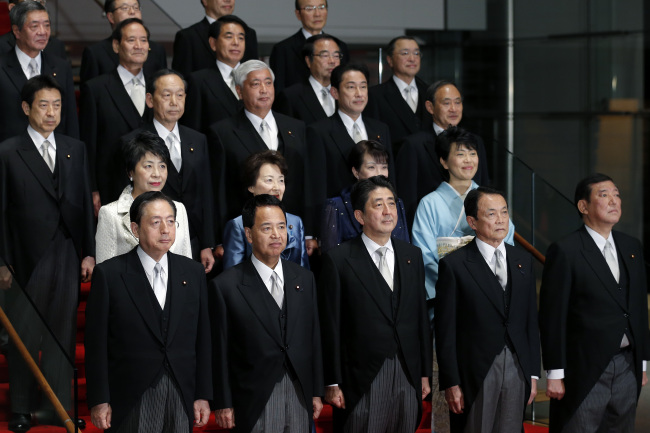Japan’s push for a greater security role is gaining traction as security hawk Shinzo Abe began his third term as prime minister Wednesday by renewing his push to revise the war-renouncing Constitution.
Buoyed by a landslide victory on Dec. 14, the nationalist leader has been seen intensifying his campaign to make Japan a “normal state” with a full-fledged military, which has been hamstrung by the “pacifist” Article 9 of the postwar constitution.
In the face of an assertive China and confrontational North Korea, Abe has argued that Japan’s limited security role should be expanded to allow for various military missions including collective self-defense ― the use of force to aid an ally under attack.
“(Revising the constitution) has been the big goal for the (ruling) Liberal Democratic Party since the party was formed, and it is a historic challenge,” Abe said during a news conference on Wednesday, in which he presented his policy vision.
“I will work hard to increase the people’s understanding of the need for a constitutional amendment.”
 |
Shinzo Abe, Japan’s prime minister (front row, center), poses for a group photograph with his new cabinet members at his official residence in Tokyo, Japan, Wednesday. (Bloomberg) |
Abe has been seeking to rewrite the constitution to build a stronger military and restore the country’s national pride, sapped by a long-standing economic malaise, the rise of neighboring states including China and frequent natural disasters.
As the constitutional revision to allow for collective self-defense is a politically tough, time-consuming process, the Abe administration has resorted to an easier method: a reinterpretation of the constitution. In July, Tokyo’s cabinet agreed to the reinterpretation.
But to gain firm legal grounds to loosen constitutional strictures on the operations of the armed forces, Abe has pushed for the constitutional revision, which requires consent from two-thirds of parliament members and a referendum vote.
Although the revision still seems unlikely, Abe is expected to push for it during his new term. Abe could stay in power for up to four more years thanks to the election victory, which would make him one of the longest-serving prime ministers since the end of World War II.
During his second term between 2012 and 2014, Abe pushed for a set of measures to advance his security agenda, which he has been promoting under the mantra of “active pacifism.”
They include establishing a national security council; passing a secrecy law; increasing defense spending; lifting an arms export ban; forming a marine unit; and purchasing offensive weapons systems including long-range rockets.
All these measures, however, have created concerns for neighboring states such as South Korea and China, as the Abe administration has failed to fully repent for the country’s wartime atrocities including the sexual enslavement of Asian women during World War II.
Abe is expected to issue a statement next year that would mark the 70th anniversary of the end of World War II. The content of the statement is expected to impact Japan’s relations with South Korea and China, which have recently come together over Japan’s lack of atonement for wartime misdeeds.
By Song Sang-ho (
sshluck@heraldcorp.com)








